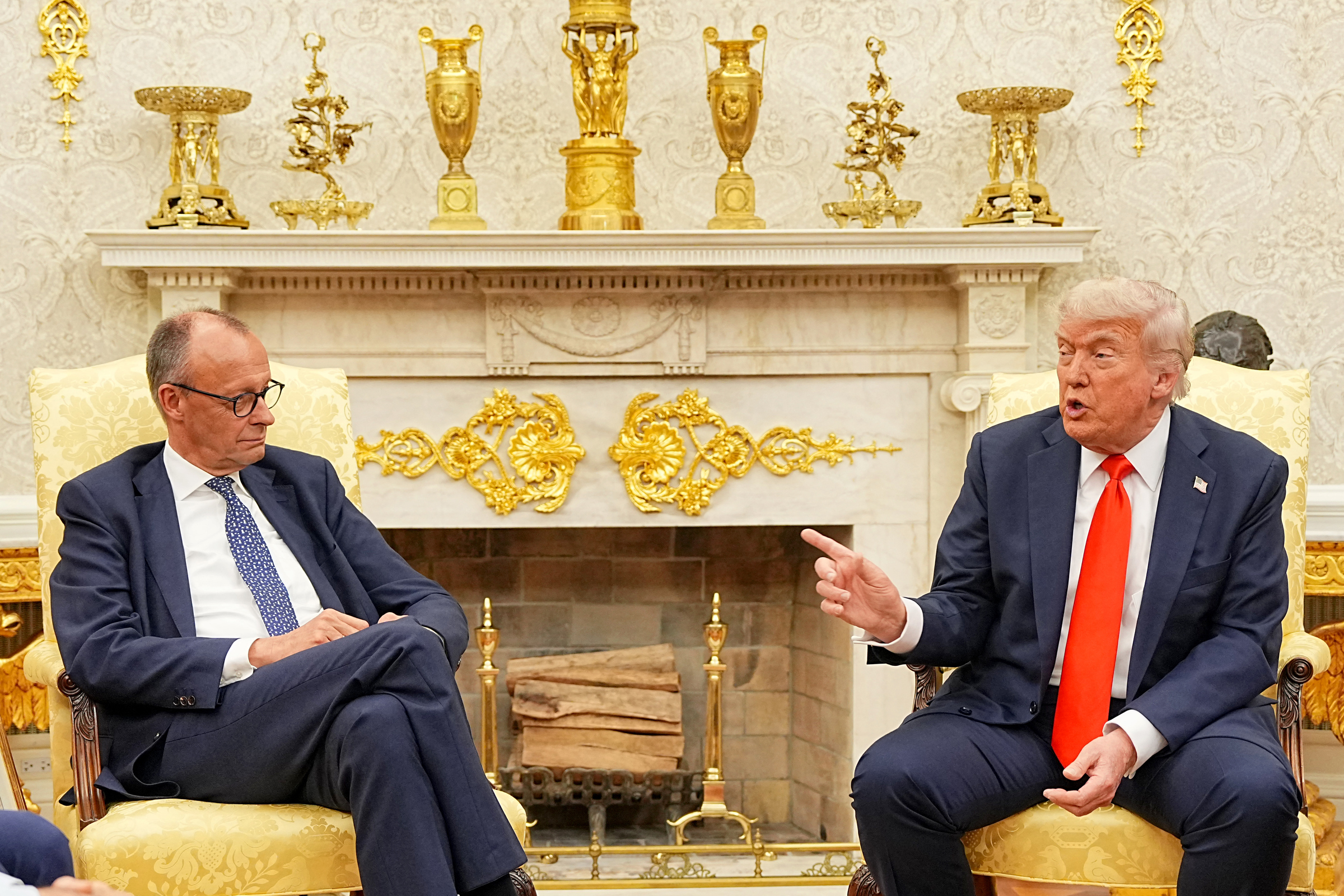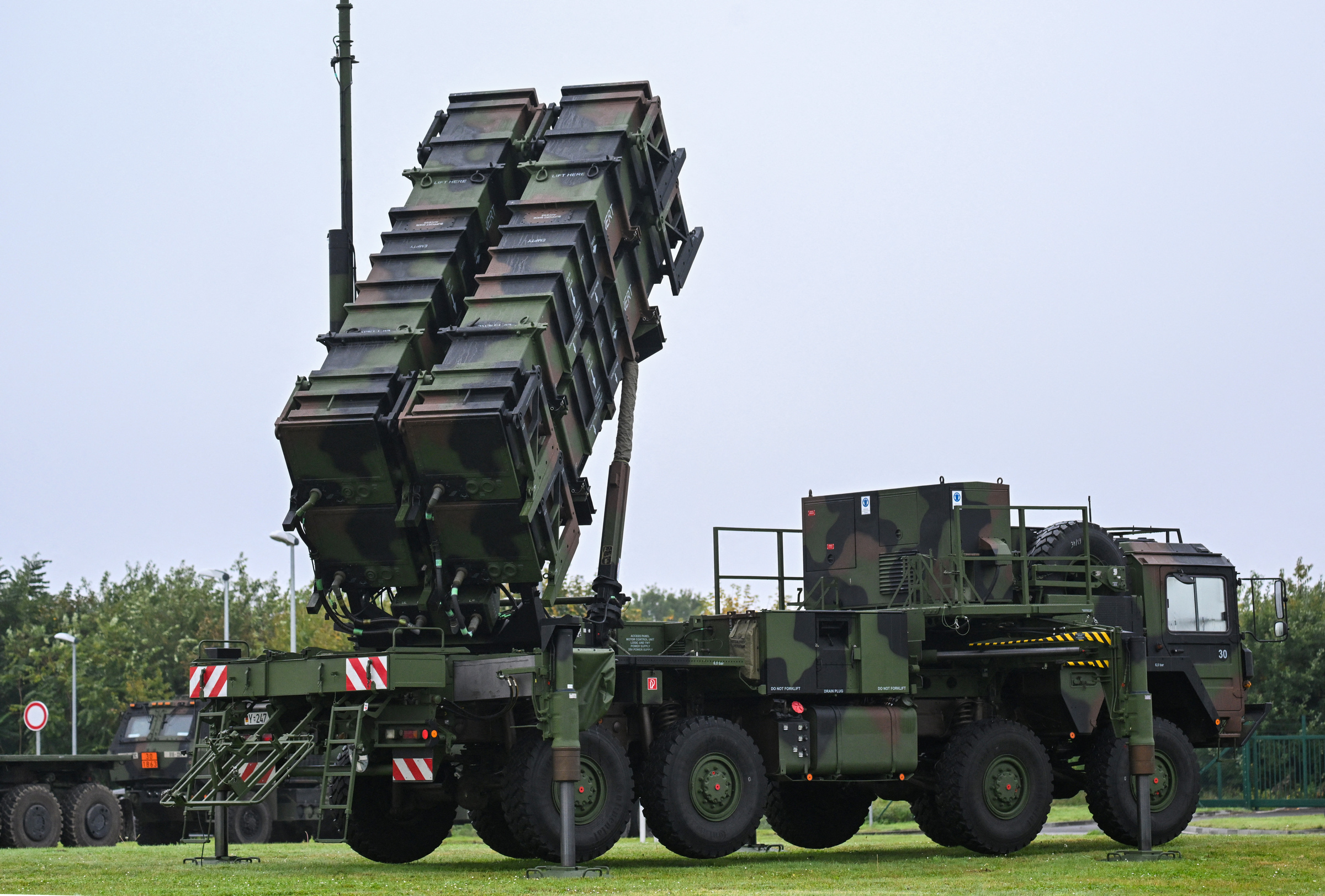After viewing footage of Russian airstrikes on Ukrainian cities on 11/7, US President Donald Trump called German Chancellor Friedrich Merz to express his outrage, according to two sources familiar with the matter. Trump then agreed to a proposal Merz had made a few days earlier: Germany would purchase US weapons and provide them to Ukraine.
The president also issued a 50-day deadline for Russia to resolve the conflict, warning of "very bad" consequences if Moscow hasn't agreed to a peace deal by then.
This signals a tougher stance from Trump towards Russia, a notable shift in his position on the war in Ukraine. It's a perspective that European leaders have been trying to convey to Trump through persistent diplomacy, aiming to persuade the US to maintain military aid to Ukraine, according to the Wall Street Journal.
 |
US President Donald Trump (right) meets with German Chancellor Friedrich Merz at the White House on 5/6. Photo: *AFP* |
To execute this strategy, leaders from Germany, France, the UK, and other nations have intensified their engagement with the US government over recent months. High-ranking politicians have also established communication channels with Trump's inner circle.
Finnish President Alexander Stubb cultivated a friendly relationship with Trump starting in March, when they played golf together in Florida. The Finnish president's office said Stubb and Trump discussed various security issues, including the war in Ukraine, over lunch.
"It's rare for Finnish presidents to spend so much time with a US president, whether in person, on the phone, or through messages," Stubb said, emphasizing the importance of maintaining strong relationships between leaders.
Speaking to CBC News, Stubb explained that his approach to foreign policy, especially with Trump, is to face reality. Instead of trying to change things, he seeks to influence the situation as effectively as possible.
Behind the scenes, European officials also worked to cultivate relationships with senior members of Trump's cabinet known for their support of Ukraine, such as Treasury Secretary Scott Bessent, Secretary of State Marco Rubio, and several Republican lawmakers.
German Vice-Chancellor Lars Klingbeil met with Bessent, who promised to lobby Trump on both aid to Ukraine and sanctions against Russia. German Foreign Minister Johann Wadephul also collaborated with Rubio on the same issue.
Chancellor Merz visited the White House on 5/6 and met with Trump. The two leaders have spoken almost daily since then, according to German officials.
Merz has found it easier to connect with Trump than previous German chancellors, his aides say. One advantage for Merz is his ability to make substantial commitments to purchase US weapons, following a German constitutional amendment allowing for virtually unlimited borrowing.
"Chancellor Merz has found an effective approach. He communicates with President Trump via mobile phone, engaging in checkbook diplomacy," said Nico Lange, a former German defense official. "He can turn commitments into action more easily than many other European leaders."
NATO Secretary-General Mark Rutte sent messages praising Trump for his decisive action in the Israel-Iran conflict. When he met with Trump at the NATO summit in the Netherlands on 25/6, Rutte described Trump as "a father stopping two children from fighting at school," which pleased the president.
At the summit, European NATO members committed to spending 5% of their GDP on defense, as Trump had requested. A few months earlier, they had persuaded Ukrainian President Volodymyr Zelensky to accept unconditional negotiations with Russian President Vladimir Putin.
The Pentagon announced in early July that it would halt aid for the Patriot air defense system to Ukraine. Upon hearing the news, Merz requested a call with Trump. The call took place on 3/7, with Secretary of Defense Pete Hegseth also present in the Oval Office.
"I'm calling to wish you a happy 4th of July and to make a proposal," Merz said, according to sources. The proposal was for Germany to purchase two Patriot systems for Ukraine, the same weapon the US had suspended aid for.
Trump appeared unaware of the Pentagon's decision. "Pete, what's going on?" he asked. A few days later, the Pentagon reversed its plan to halt Patriot aid to Ukraine.
On 11/7, after viewing more footage about Ukraine, Trump called Merz and offered to sell five Patriot systems. The German chancellor immediately agreed, although he knew he would need time to negotiate with other European leaders.
According to Politico, European leaders understand that if they propose arms purchases that benefit the US financially, Trump is more likely to agree.
They also know that Trump doesn't want a direct confrontation with Russia, as it would alienate the isolationist faction of his MAGA base, which opposes US involvement in foreign conflicts. By purchasing US weapons and supplying them to Ukraine, Europe provides a rationale for Trump to persuade these voters and make a more favorable decision.
 |
A Patriot air defense system launcher in Cologne-Wahn, western Germany, in 10/2023. Photo: *AFP* |
Germany is likely to transfer two of its own Patriot systems to Ukraine and order two new ones from the US as replacements, at a cost of around 2 billion USD. Norway will purchase one system, while Rutte suggested that Canada, Denmark, and Finland might also join the effort.
"One thing is clear, and this is also a call to other European NATO member states: we all have to open our wallets now," German Defense Minister Boris Pistorius said on 14/7 during a visit to Washington.
"We are doing this for our own benefit as well," Merz said on 15/7. "The US and Europe are now united. This will help Ukraine cope with Russian attacks. Only in this way can we increase pressure on Moscow to engage in serious peace negotiations."
Meanwhile, Kremlin spokesman Dmitry Peskov described Trump's ultimatum as "serious" and said Russia "will certainly need time to study it." He emphasized that Russia remains open to negotiations, but suggested that Trump's statement might lead Ukraine to believe it's "an encouragement to continue the war, not a signal for peace."
Nhu Tam (*Via WSJ, Politico*)












